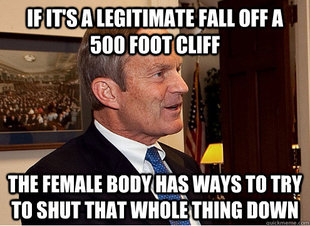The most recent “oops”
from men on women’s biology and reproductive rights comes to us from Todd Akin,
Republican Congressman from Missouri. He told a St. Louis television station
that there is, apparently, such a thing as “legitimate rape” and that when it
happens, women do not get pregnant because, evidently, their lady bits turn off
in order to prevent conception. Akin explains, “If it’s a legitimate rape, the
female body has ways to try to shut the whole thing down.” Apparently, abortion
can be regulated based on “legitimacy” of the sexual act that led to
conception. This made some
people angry.
Aside from Akin’s
horrifyingly inaccurate biology knowledge, which Democratic Senator from
Missouri, Claire McCaskill, called “ beyond comprehension that someone can be so
ignorant about the emotional and physical trauma brought on by rape,” his
innuendos about legitimacy and validity in rape is destructive and,
unfortunately, not an uncommon offense in the past few months.
Akin is one of many
contemporary male politicians who have made problematic public remarks about
rape and sexual abuse that misinform the public on social norms, legality, and
gender relations and also reinforces a culture of victim blaming. On August 20th,
former Republican governor of Arkansas Mike Huckabee used the phrase,
“forcible” rape, suggesting that rape is not always forced on women as violations
or abuse. In the
UK, Justice Secretary, Kenneth Clarke claimed “date rape” was less
“serious” than other attacks and George Galloway, the Respect MP, played down
the sex crime allegations against Julian Assange. In 2011, Roger Helmer made a
distinction between “classic stranger rape” and “date rape,” writing on his
blog, “rape is always wrong, but not always equally culpable.” As Louise Mensch
of The
Telegraph writes, “Rape is having a moment. And not in a good way… from the Left and the Right, male politicians and
two-bit “public figures” have made common cause on rape. Not to condemn it, or
to pledge tougher action in policing it; but to minimize and dismiss it as a
crime.”
The current trend of
misinformed and judgmental conversation about rape and sexual abuse in politics
is complicated by the mixed signals about healthy sexual relationships in pop
culture because both risk misinforming people about sexual violence. The rise
of S&M literature that romanticizes sexual dominance, vampire fantasies
with violent sexual themes, and music that glamorizes aggressive sexuality only
feeds the flame of considering some acts of sexual violence more acceptable
than others. The Fifty Shades of Grey series is empowering
for many men and women, but it also sends confusing signals about healthy
relationship dynamics and power hegemonies between couples. The vampire craze
offers a mystical love plot but also confusingly mingles sexual and violent
interactions, and recent Top 40 songs have popularized themes of rape and
sexual dominance, notably Rihanna’s “S&M”
(“Now the pain is my pleasure”) and Katy Perry and Kanye West’s “E.T.” (“Take me, take me
/ Wanna be a victim / Ready for abduction”). While these trends have promoted
acceptance of diverse sexualities, they also risk blurring the line between
consent and rape. Clearly there should not be a prescribed “normal” sexuality,
but our society needs to make it clear that rape is never “illegitimate,”
regardless of sexual preferences.
Without dismissing
diversity in sexuality, politicians and the media need to send a clearer
message about what sexual violence is, how to recognize it, and how to react to
it. Establishing a clear definition of rape and abuse does not conflict with
acknowledging sexual diversity and these public spheres need to be responsible
for communicating that distinction so that our culture does not become
complacent or ignorant of violence.


